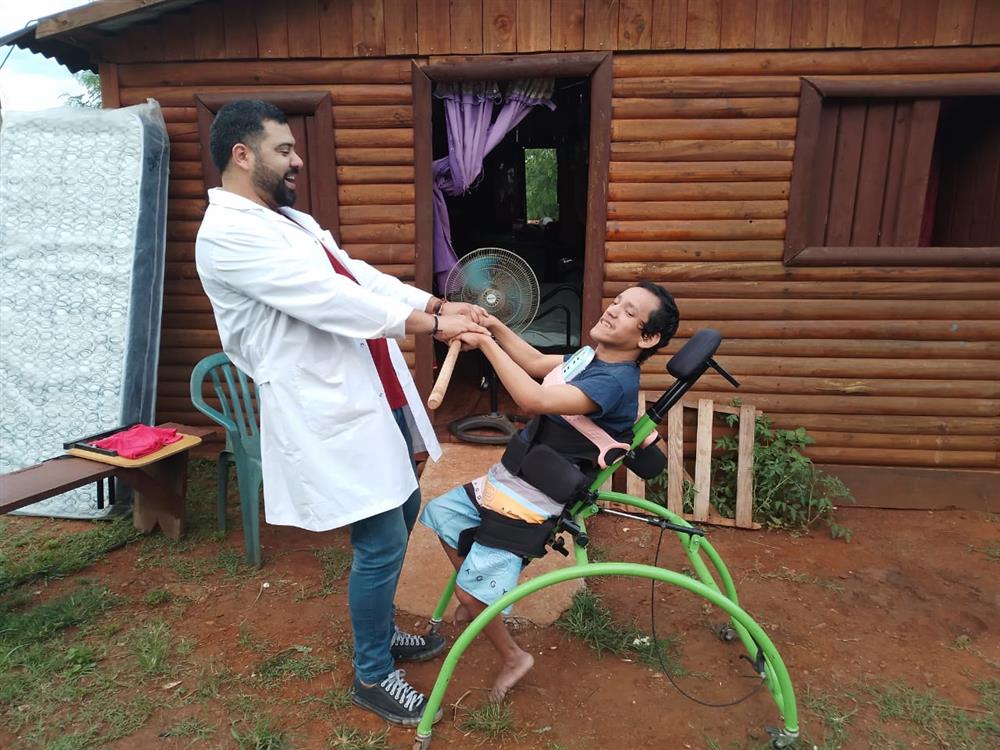Low-cost and resourceful provision of therapeutical as well as pedagogical services to children in remote areas
- Solution
- Caminos de Tiza
- Country of Implementation
- Argentina
- Start Year
- 2014
- First published
- 03.12.2023

Solution details
“Our intervention model has inspired public policies and is taken as a reference by foundations and NGOs.” Julio Pereyra, Professor, Caminos de Tiza School
Caminos de Tiza, run by the Argentine NGO Escuelita Ambulante, delivers therapeutic and educational support to disabled individuals in isolated areas along the Argentina/Brazil/Paraguay border. This programme emphasizes early neurodevelopmental disorder detection and assistive device provision, focusing on underserved indigenous communities. Entirely funded by donations and in-kind support, Caminos de Tiza reached 14 communities and 365 children in 2023, and has trained some 10,000 teachers from 2014 to 2023.
Problems Targeted
In countries with extremely remote regions and for indigenous communities there is a lack of therapeutic, pedagogical, and educational services for children with disabilities.
Solution, Innovation and Impact
Escuelita Ambulante's Caminos de Tiza, utilizing a mobile bus, offers therapeutic and educational services to children and youth with disabilities in remote rural areas of the Argentina, Brazil, and Paraguay border region, focusing on indigenous communities. The programme integrates various educational methods, including rural, special, and intercultural bilingual education, in four languages: Guarani, Spanish, Portuguese, and sign language. Its curriculum covers literacy, hygiene, primary care, sexual health, orthopaedics, assistive technologies, and early intervention. Caminos de Tiza also trains parents, caregivers, and teachers in recognizing neurodevelopmental disorders and maintaining therapeutic orthopaedic equipment. The project emphasizes stress reduction, sensory saturation management, cognitive accessibility, and medical methods. It also addresses autonomy and primary health care aspects, such as the use of nasogastric tubes, catheters, and dental hygiene. Founded by two volunteers with disabilities, the programme educates families on handling disabilities, providing resources and materials for continuous therapeutic/pedagogical support. It reaches people through community references and social networks, covering indigenous communities, rural areas, and impoverished neighbourhoods in Argentina’s north-eastern region. Staffed by volunteers without external funding, Caminos de Tiza ensures service quality through public accountability, academic contributions, and community-based management.
Funding, Outlook and Transferability
Escuelita Ambulante Caminos de Tiza, founded by two individuals with disabilities, operates independently without significant funding or public sector support. The organization primarily leverages social networks to attract sponsors and benefactors, securing donations including food, therapeutic, orthopaedic, educational, and pharmacological supplies. Notably, Caminos de Tiza takes pride in its autonomy from government assistance. However, it has significantly influenced government policies regarding child care and education in remote areas, with aspects of its approach being adopted in public caretaking services. (Awardee 2024)
Media
Pictures
Related information
- Connections
- 1
-
People